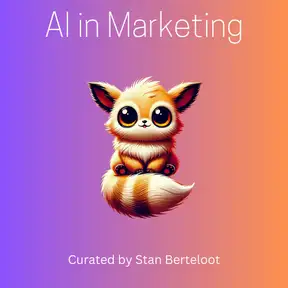Pfizer's AI Disruptions, Nvidia's Realistic AI Humans, Tesla Trade Secret Theft, The TikTok Podcast Dilemma, and Marc Lore's Wonder Start-up
Download MP3Delve into the world of AI in marketing with "Ai in Marketing with Nytro Marketing," your source for the latest news and insights. In this episode, we discuss Pfizer's unveiling of its revolutionary AI platform "Charlie," a tool set to disrupt the pharmaceutical marketing landscape. We explore NVIDIA's leap in AI with the creation of hyper-realistic digital humans, suggesting new possibilities in digital media and gaming. We also examine the recent US government charges against two men for stealing confidential business information from Tesla. In the world of social media, we assess TikTok's impact on podcast discovery, revealing a potential weak link between the platform's engagement and actual listenership. Lastly, we focus on the buzz surrounding Marc Lore's restaurant startup Wonder, raising an eyebrow-raising $600 million despite investment trends leaning towards AI startups. Stay tuned to dig deep into these headlines and more. Transcript: Today is Wednesday, March 20th - Here is what we are covering
- Pfizer recently unveiled its innovative AI platform, “Charlie," a revolutionary tool designed to disrupt pharmaceutical marketing. Named after Pfizer's co-founder Charles Pfizer, Charlie is an AI-enabled platform that aims to enhance marketing strategies by streamlining content creation, editing, and reviewing. However, with the integration of AI technology, data privacy issues and potential bias in generated content are emerging as key talking points in healthcare marketing.
-
NVIDIA's Digital Human Technologies pushes the envelope in artificial intelligence, creating characters that move and respond with surprising realism. By deploying machine learning techniques and datasets from the human body, NVIDIA can create digital humans that can move and react in ways that mirror real life, pushing the boundaries of AI and machine learning. This impressive advancement points to new possibilities in the digital realm, from more authentic CGI in films to increasingly interactive and adaptive AI in gaming.
-
The US government has recently charged two men for allegedly stealing confidential business information from electric vehicle maker Tesla. The men, both linked to a Chinese start-up company, are accused of stealing trade secrets related to Tesla’s Autopilot system. In response, Tesla emphasized the importance of protecting intellectual property and affirmed cooperation with authorities in this investigation.
-
Despite the theory that TikTok is the key to newfound podcast discovery, podcasters have reported a weak connection between TikTok engagement and actual listenership. A proposed US bill could force Chinese company ByteDance to sell TikTok or ban it from operating in the US, complicating the marketing strategies of shows like NPR's Planet Money and independent podcasters who utilize the platform for exposure. While some insist that traditional marketing yields better results, hosts of niche shows like Espooky Tales and Historias Unknown have seen significant listener growth from viral TikTok videos.
-
Finally, Marc Lore, the entrepreneurial virtuoso behind the restaurant startup Wonder, has certainly stirred up the investment community by raising an impressive $600 million. Despite recent trends showing a preference for artificial intelligence startups, Lore's concept for Wonder, a vertically integrated restaurant and meal-delivery service, has attracted backers from venture names such as NEA and Accel to American Express and Nestlé. Notably, during this funding round, Wonder exercised a SAFE note investment, generally used with early-stage startups, which provides investors a discount on the valuation when the company goes public.
This podcast, art, and text are AI-generated.
- Pfizer recently unveiled its innovative AI platform, “Charlie," a revolutionary tool designed to disrupt pharmaceutical marketing. Named after Pfizer's co-founder Charles Pfizer, Charlie is an AI-enabled platform that aims to enhance marketing strategies by streamlining content creation, editing, and reviewing. However, with the integration of AI technology, data privacy issues and potential bias in generated content are emerging as key talking points in healthcare marketing.
-
NVIDIA's Digital Human Technologies pushes the envelope in artificial intelligence, creating characters that move and respond with surprising realism. By deploying machine learning techniques and datasets from the human body, NVIDIA can create digital humans that can move and react in ways that mirror real life, pushing the boundaries of AI and machine learning. This impressive advancement points to new possibilities in the digital realm, from more authentic CGI in films to increasingly interactive and adaptive AI in gaming.
-
The US government has recently charged two men for allegedly stealing confidential business information from electric vehicle maker Tesla. The men, both linked to a Chinese start-up company, are accused of stealing trade secrets related to Tesla’s Autopilot system. In response, Tesla emphasized the importance of protecting intellectual property and affirmed cooperation with authorities in this investigation.
-
Despite the theory that TikTok is the key to newfound podcast discovery, podcasters have reported a weak connection between TikTok engagement and actual listenership. A proposed US bill could force Chinese company ByteDance to sell TikTok or ban it from operating in the US, complicating the marketing strategies of shows like NPR's Planet Money and independent podcasters who utilize the platform for exposure. While some insist that traditional marketing yields better results, hosts of niche shows like Espooky Tales and Historias Unknown have seen significant listener growth from viral TikTok videos.
-
Finally, Marc Lore, the entrepreneurial virtuoso behind the restaurant startup Wonder, has certainly stirred up the investment community by raising an impressive $600 million. Despite recent trends showing a preference for artificial intelligence startups, Lore's concept for Wonder, a vertically integrated restaurant and meal-delivery service, has attracted backers from venture names such as NEA and Accel to American Express and Nestlé. Notably, during this funding round, Wonder exercised a SAFE note investment, generally used with early-stage startups, which provides investors a discount on the valuation when the company goes public.
This podcast, art, and text are AI-generated.

